When it comes to a degree in law, there are many different types to choose from. These include the Juris Doctor, Master of Laws, Doctor of Juridical Science, and Legal Certificate Programs. Each degree has its own specializations and the choice of which to pursue should be based on the type of law you intend to practice. These degrees require specific training and a thorough understanding of the subject matter. This article will discuss the most common degrees and what they entail.
Juris Doctor

The requirements for a Juris Doctor law degree vary widely. In general, law school applicants should complete a minimum number of hours of classroom instruction each academic term. Additionally, they should complete mandatory courses during the first year of law school. The majority of states require that J.D. students take an English language competency course, which is usually in the form of the TOEFL. There are some exceptions, however. This article provides a quick overview of the requirements for a Juris Doctor law degree.
Unlike a Juris Master’s degree, a Juris Doctor law degree can be earned by graduates of many different disciplines. As such, it is a stepping stone to a legal career. Although the American Bar Association originally required that students hold a Bachelor’s degree, the law degree was later made a graduate-level degree. Some lawyers have professional skills and other backgrounds that are unrelated to law, such as business management or teaching.
Master of Laws
The Master of Laws (LLM) program is highly customizable to meet the needs of students interested in pursuing a career in the legal profession. The curriculum focuses on a variety of topics, such as legal analysis, writing, and regulatory and intellectual property law. The Master of Laws degree can also be earned by taking a specialization in one of these areas. In addition, the Master of Laws program also requires students to complete a comprehensive research paper.
After completing the core requirements for the program, LLM students can take four elective modules that further their interest in specific areas. They can complete a dissertation to present their own research. The Master of Laws program is designed to provide students with advanced legal research and writing skills, as well as the opportunity to critically evaluate complex legal issues in a global context. Courses will be taught in a mixture of on-campus and distance-learning formats, so students can study at their own pace and convenience.
Doctor of Juridical Science
The Doctor of Jurridical Science (D.J.S.) degree is a highly specialized degree. Its coursework focuses on research. It is important to identify your interests in research before beginning the application process. The majority of doctoral students spend their time defending their dissertation. In addition to researching their chosen area of study, doctoral students work with an advisor throughout their first year in the program. This advisor can help you determine the courses you will need to complete the degree.
A Doctor of Juridical Science (SJD) degree is an advanced degree in law that focuses on original scholarship under faculty supervision. Students completing this degree must produce publishable scholarship that makes a unique contribution to the legal scholarly literature. The program is primarily designed for individuals who plan to teach law, practice law, or engage in policy work. While a Doctor of Jurridical Science degree is not required for practicing law, it can enhance your career prospects in the legal field, Check out the post right here.
Legal Certificate Programs

While a full law degree is the most common path to the bar exam, there are other opportunities to pursue specialized knowledge. For example, media law can provide a broad base of knowledge in areas such as intellectual property licensing, digital privacy rights, and media liability insurance. Upon graduation, a graduate of a legal certificate program in media law will be able to work in various roles in the media, including contract negotiation and attorney for hire.
Legal certification programs can also enhance professional credentials. These credentials help the candidate demonstrate their expertise in a field and are useful in attracting and maintaining clients. They can also earn respect from peers and enhance their public image. But it is important to note that legal certifications do not lead to a law degree and may be unrelated to the field. For these reasons, many students choose legal certifications over traditional degrees as a way to gain practical experience and gain an edge over others.
